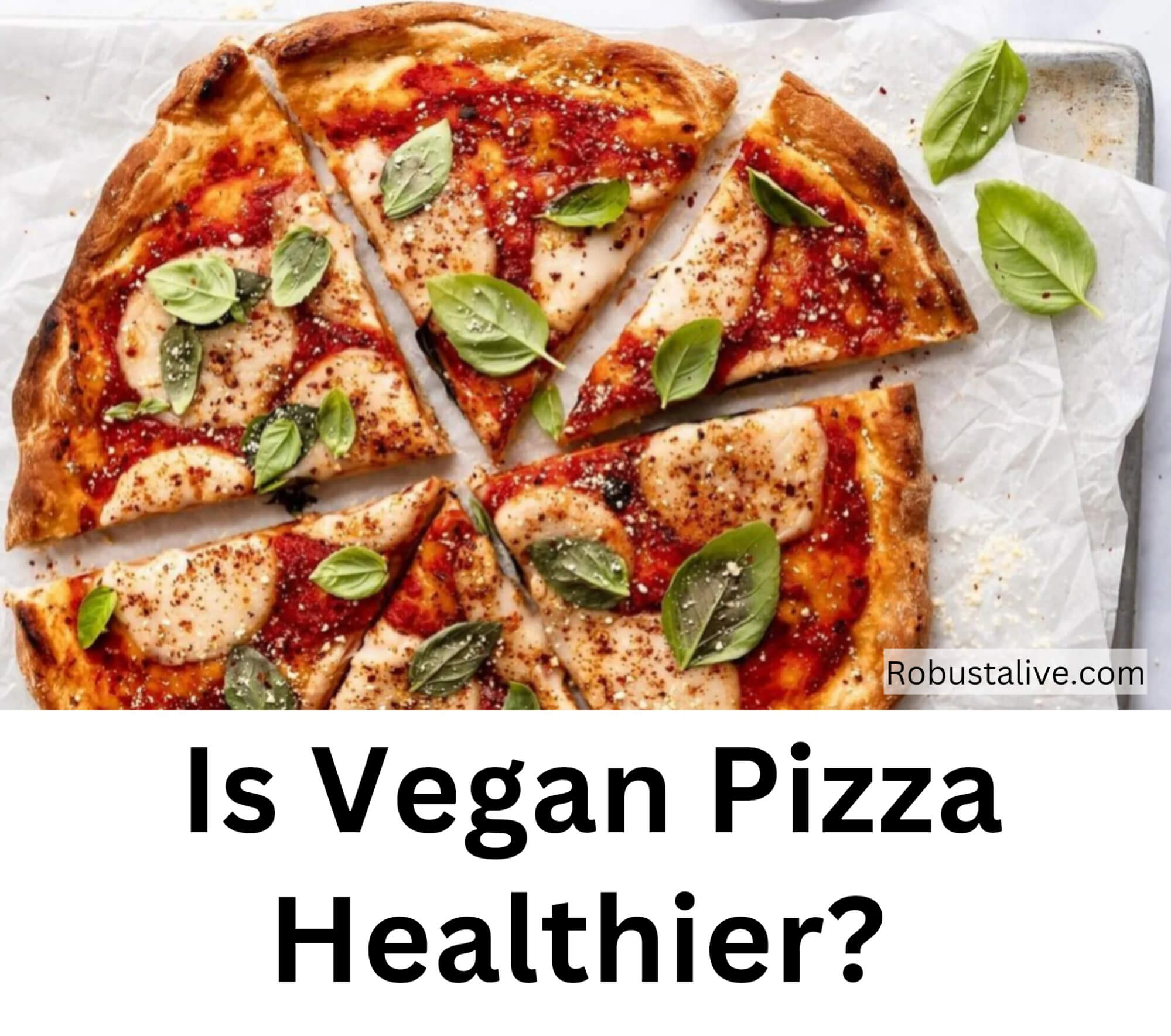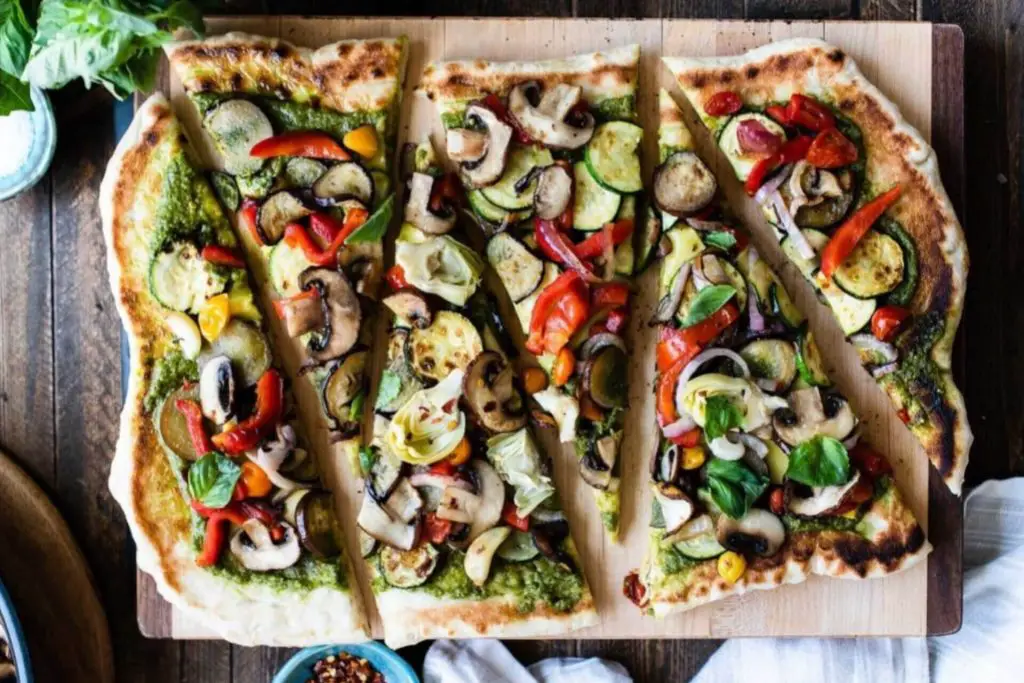Is Vegan Pizza Healthier?

Pizza is undeniably a beloved comfort food for many, and in today’s world, where we’re becoming more conscious of our health and the environment.
So, is vegan pizza healthier?
Certainly! Vegan pizza tends to be a healthier choice. It’s lower in calories, saturated fat, and sodium than traditional pizza. This benefits heart health and weight management while offering essential nutrients and catering to various dietary needs, promoting overall well-being.
In this article, we’ll explore if vegan pizza truly is healthier than its traditional counterpart, along with Its health benefits. Keep reading!
Is Vegan Pizza Healthier?
Vegan pizza, unlike regular pizza, is crafted solely from plant-based ingredients, altogether omitting any animal products.
It is often perceived as a healthier alternative due to its lower levels of saturated fat and cholesterol compared to traditional meat and cheese-laden pizzas.
Surprisingly, this delightful creation appeals not only to those adhering to a vegetarian lifestyle but also captivates the taste buds of meat-eaters striving for healthier choices and reduced environmental impact.
Beyond health considerations, vegan pizza champions sustainability as well. It can be found in various forms, like frozen pizzas, making it an effortless, convenient option for a guilt-free meal at home.
The growing popularity of plant-based alternatives such as vegan pizza continues unabated as more individuals recognize the associated health benefits and environmental significance.

Source: Pinterest
Is Vegan Pizza Healthier Than Regular Pizza?
Now, let’s compare if vegan pizza is really healthier than regular or traditional pizza.
Calories
Calories are the first line of defense for individuals who are conscious of their diet. In this category, vegan pizza generally comes out on top.
Vegan pizza has fewer calories because it doesn’t have cheese or meat toppings, which are notoriously rich in calories.
Pizza made from vegan ingredients—plant-based foods including grains, fruits, and vegetables—has fewer calories by nature.
For comparison, a slice of standard cheese pizza can contain about 300 calories, whereas a vegan version typically contains about 200 calories per slice.
For people attempting to maintain a balanced diet, this calorie differential may be considerable.
Nutrition
Vegan pizza emerges as the frontrunner in terms of nutrition. The key lies in utilizing whole, unprocessed, plant-based ingredients with nutrients that form the foundation of this dish.
By incorporating fiber-rich components and essential vitamins and minerals, these ingredients enhance the nutritional value of your dinner.
In contrast, traditional pizza often relies on refined wheat flour and processed meats, which offer fewer nutrients and may even pose health risks.
Fat Content
Another battleground for the health-conscious pizza lover is the realm of fat content. Vegan pizza once again scores points for being lower in saturated fat compared to traditional pizza.
Heart disease is known to be attributed to saturated fat, which is primarily present in cheese and meat toppings.
Pizza made from vegan ingredients, including avocado, almonds, and olive oil, takes a different approach.
This strategic choice not only enhances the pizza’s flavor but also reduces the intake of harmful saturated fats. It’s a win-win for taste and health.
Sodium Content
Now, let’s talk about sodium, a silent but significant player in the health game. Traditional pizza often packs a sodium punch, courtesy of processed meat and cheese. Vegan pizza, on the other hand, tends to be gentler on your blood pressure.
The absence of processed ingredients in vegan pizza means it typically features fresh vegetables and herbs, which are naturally low in sodium.
Ingredient Evaluation
Now, let’s dissect the common ingredients found in both regular and vegan pizza to gain a deeper understanding of their impact on health:
| Ingredients | Vegan Pizza | Regular Pizza |
| Crust | Vegan pizza crust often uses whole wheat or alternative flours, providing more fiber and nutrients, contributing to a healthier base. | Traditional crust is typically made with refined wheat flour, offering fewer nutrients. |
| Cheese | Uses plant-based alternatives like tofu, cashews, or almond milk, typically lower in unhealthy fats and calories. | Relies on dairy-based cheese with saturated fat and cholesterol. |
| Meat Toppings | Creatively replaces meat with plant-based proteins like tempeh, seitan, or legumes, offering fiber, essential nutrients, and savory flavors without health concerns. | Frequently features processed meat toppings with high cholesterol and saturated fat. |
| Sauce | Often sticks to fresh ingredients like tomatoes, garlic, and herbs in vegan pizza sauce. | May include added sugar and preservatives in traditional pizza sauce. |
| Vegetables | Both types can incorporate vegetables, but vegan pizza often has an abundance of fresh veggies like bell peppers, mushrooms, onions, and olives, providing vitamins, minerals, and fiber. | |
What Are The Drawbacks of Vegan Pizza?
Vegan pizzas can vary in healthiness. Some are high in sodium due to processed meat substitutes. They tend to have lower protein compared to meat and cheese pizzas.
It’s essential to watch out for processed ingredients and check the quality of vegan cheese for nutrition. Controversial ingredients like soy-based cheese and unhealthy vegetable oils are commonly used.
What Are the Health Benefits Of Vegan Pizza?
Choosing vegan pizza can be a wise move for your health in several ways:
Heart Health
Opting for vegan pizza is a heart-smart choice. Studies show that it contains lower cholesterol and saturated fat compared to traditional pizzas.
By embracing vegan pizza, you can actively reduce the risk of coronary heart disease, potentially by as much as 40%.
Gut Health
Vegan pizza is gentle on your digestive system. Scientific research indicates that plant-based diets, like the one vegan pizza is part of, can work wonders for gut health.
This translates to improved digestion and a more comfortable gut due to a broader variety of gut microbiota. When you choose vegan pizza, you’re essentially promoting digestive well-being.
Weight Management
Vegan pizza can be a solid ally if you’re watching your weight. It often has fewer calories than standard pizza, which makes it simpler to control your weight and have a healthy body.
Dietary Flexibility
Vegan pizza is incredibly adaptable and accommodates various dietary restrictions. It does not contain cholesterol or dairy, making it an excellent choice for individuals who are lactose intolerant or have high cholesterol levels.
Additionally, it seamlessly aligns with low-fat or low-sodium diets, catering to specific dietary needs.
Diabetes Management
There’s another layer of health benefit to your slice of vegan pizza – it can play a role in managing diabetes. Research indicates that including plant-based or vegan meals in one’s diet can substantially decrease the likelihood of developing Type 2 diabetes.
How To Know If My Pizza Is Vegan?
To determine if a pizza is vegan, you should:
Step 1: Check the label for vegan certifications.
Step 2: Look at the ingredients list for any dairy, eggs, or other animal products.
Step 3: Ask the restaurant staff for clarification if you’re unsure.
As for the healthiness of vegan pizza, it varies based on the ingredients used. Opting for whole, minimally processed ingredients can make it a healthier choice compared to pizzas with processed components.

Source: Forks Over Knives
How To Make Pizza Healthier
- Choose Whole-Wheat Crust: Consider using whole-wheat or whole-grain crusts for added nutrients and fiber. Furthermore, some restaurants offer options that are gluten-free or cauliflower.
- Load Up on Veggies: Pile on nutritious veggies like mushrooms, onions, bell peppers, spinach, and broccoli. They not only enhance flavor but also provide essential vitamins and minerals.
- Be Cheese Smart: Go easy on the cheese to cut down on fat and calories. Consider using low-fat cheese or try a tasty vegan cheese alternative.
- Pick Lean Proteins: If you crave meat, go for lean choices like grilled chicken or turkey sausage over high-fat options like pepperoni or sausage.
- Mind Your Portions: Watch your portion sizes to avoid overindulgence. Depending on the size, one or two slices can be a satisfying serving.
Easy And Healthy Vegan Pizza Recipe
This pizza is a healthy choice, loaded with veggies, and perfect for satisfying your cravings while staying on the path towards your goals.
For the Dough:
- 1 cup water
- 3 cups whole wheat flour
- 2 tsp dry active yeast
- 1 tsp salt
For the Toppings:
- 1/2 bell pepper, chopped
- 1/2 onion, chopped
- 1 cup mushrooms, chopped
- 4-5 artichoke hearts, diced
- 2 cups spinach
- 4-6 olives, diced
- 1/2 cup low-fat marinara sauce
- 1 tbsp nutritional yeast
Step 1: Make The Dough
- To start making bread, set up your bread maker if you have one. Add 1 cup of water, 3 cups of whole wheat flour, 2 tsp of dry active yeast, and 1 tsp of salt.
- Use the dough function on your bread maker to mix and knead everything together. However, no worries if you don’t have a bread maker; we’ve got you covered with the next steps.
Step 2: Mixing The Dough Without A Bread Maker
- In a mixing bowl, combine 3 cups of whole wheat flour and 1 tsp of salt.
- Slowly pour in 1 cup of water while gently stirring with a spatula until the dough comes together.
- Once it’s mixed, take the dough out of the bowl and place it on a floured surface. Give it some love by kneading it for about 5 minutes.
Step 3: Preheat The Oven
Preheat your oven to a toasty 400 degrees Fahrenheit.
Step 4: Shape the Dough
- Sprinkle a bit of flour on your work surface.
- Roll out the dough into a lovely, long log.
- Slice it into three equal sections and roll each section into a delightful ball.
- Now, take each ball and turn it into a thin crust, stretching it gently as you go. Keep those bubbles at bay by making small cuts with your fingertips.
Step 5: Bake the Dough
- Lay your thinly stretched dough on a baking sheet with a sprinkle of flour underneath.
- Bake the dough by itself for a quick 2 minutes to get it started.
Step 6: Add Toppings
- Take out the half-baked dough from the oven, marking the transition to the more enjoyable phase.
- Proceed by spreading 1/2 cup of low-fat marinara sauce over the dough.
- You can experiment with various toppings, like finely chopped bell peppers, onions, mushrooms, artichoke hearts, spinach, a few olives, and nutritional yeast, for an extra flavor boost.
Step 7: Bake Again
- Return your pizza to the oven.
- Let it bake for 15-18 minutes until the crust transforms into a beautiful golden hue and those toppings are cooked to perfection.
Step 8: Cool and Share
- Give your vegan pizza a pause for about 5 minutes to cool off a bit.
- Then, cut it into slices and savor your homemade pizza creation.
FAQs
Is Vegan Cheese Healthy?
Vegan cheese can be a part of a healthy diet when enjoyed in moderation. However, its healthiness varies by brand and ingredients. Some are heavily processed with additives, so remember to check labels and opt for options with whole-food ingredients for a healthier choice.
Is Vegan Pizza Gluten-Free?
Gluten-free toppings and a gluten-free crust can make vegan pizza gluten-free. To be sure, check the ingredients or inquire at the restaurant, as not all vegan pizzas are inherently gluten-free.
Is Vegan Pizza Lactose-Free?
Vegan pizza is indeed lactose-free. It is ideal for those who are lactose sensitive because it incorporates plant-based cheese alternatives that are lactose-free.
Is Vegan Pizza Healthier: Bottomline
In conclusion, usually vegan pizza is healthier than traditional pizza. It boasts lower calories, less saturated fat, and reduced sodium content, benefiting heart health, digestion, weight management, and dietary flexibility.
However, it’s essential to be mindful of ingredient quality in vegan options. Embracing vegan pizza not only supports personal well-being but also contributes to a more sustainable and environmentally conscious food choice. Stay healthy!





